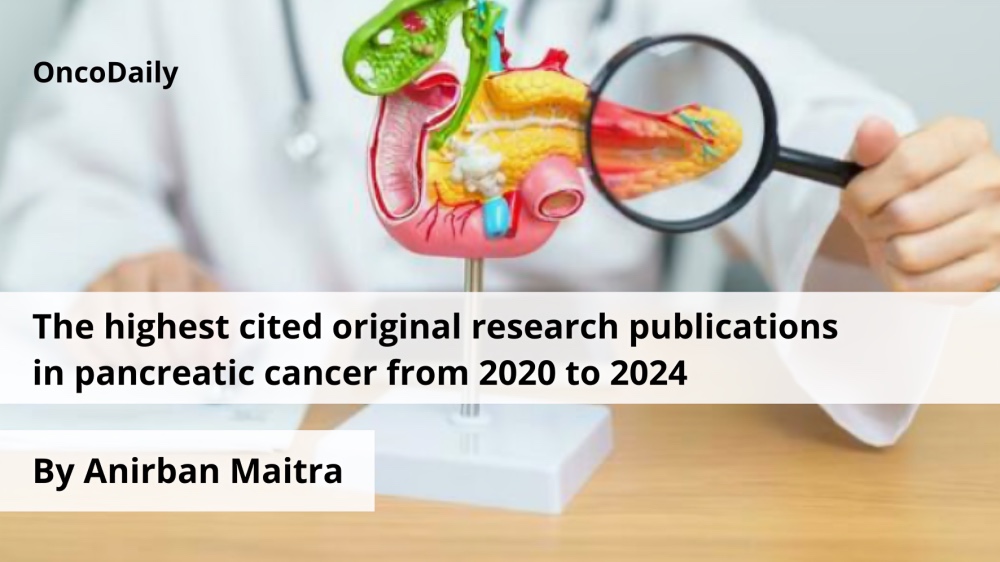Anirban Maitra, Professor of Pathology and Translational Molecular Pathology at UT MD Anderson Cancer Center, shared a post on X:
“Which are the highest cited original research publications in Pancreatic Cancer over the past five years (from 2020 to 2024 end)?
All metrics obtained from Google Scholar (caveat: GS tends to OVERESTIMATE citations but the trends are consistent overall).
First, the highest cited publication OVERALL (not surprisingly) is a REVIEW on Pancreatic Cancer published in The Lancet by Rachna Shroff, Jon Mizrahi et al in 2020 (cited >2100 times):
Authors: Jonathan D Mizrahi et al.
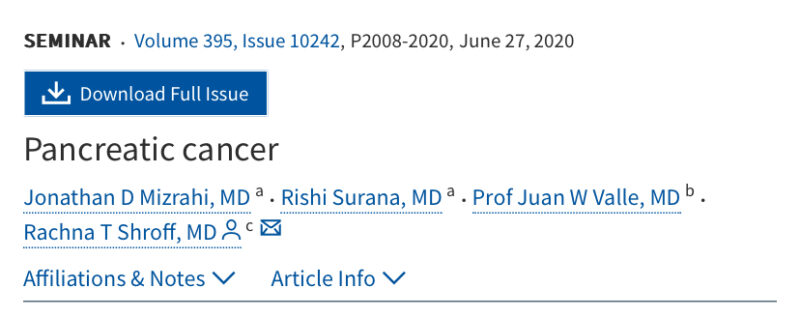

Followed by a review in JAMA Oncology by Eileen M. O’Reilly, Wungki Park et al published in 2021, cited >1200 times.
Authors: Wungki Park et al.

Both outstanding foundational reviews on the subject!
The highest cited ORIGINAL research paper in Pancreatic Cancer over the last five years is the 2020 Nature paper from Alec Kimmelman and Rushika M. Perera. With an astounding ~900 citations in five years (!!), this paper really provided important mechanistic insights into how pancreatic cancer cells evade the host immune system.
Autophagy promotes immune evasion of pancreatic cancer by degrading MHC-I
Authors: Keisuke Yamamoto et al.
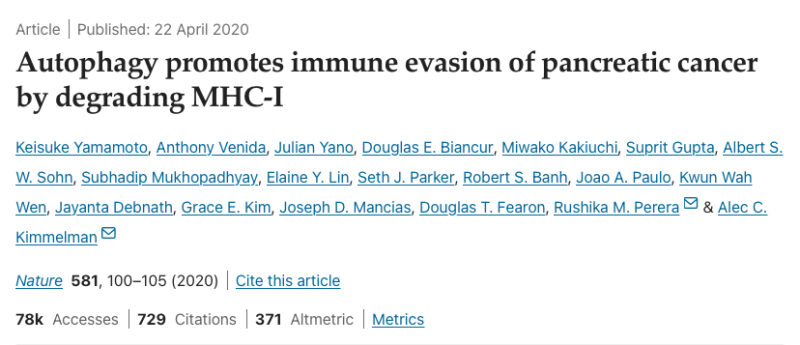
I wrote an accompanying NatureNV to this wonderful article.
Pancreatic cancer hidden in plain sight.
Next up is the seminal Phase 1 data on neoantigen targeted mRNA vaccines from Eileen M. O’Reilly, Benjamin D. Greenbaum and colleagues published in Nature in May 2023.
This was a partnership with BioNTech Group and Genentech, and a Phase 3 trial is ongoing.
With >560 citations this paper has opened up enormous possibilities for mRNA and orthogonal vaccine based approaches like mutant KRAS targeted amphiphile peptides in the adjuvant space (some have been published or are ongoing). Why some patients respond to these vaccines with a robust T cell response and others do not is the next big unanswered question.
Personalized RNA neoantigen vaccines stimulate T cells in pancreatic cancer
Authors: Luis A. Rojas et al.
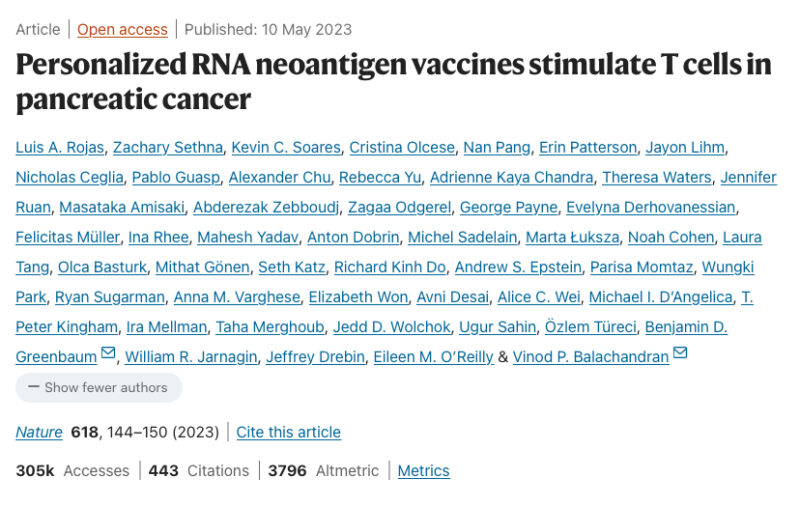
Next the Dutch take the candles in terms of highly cited Pancreatic Cancer papers, with the 2022 JCO ASCO publication on the long term results from the famous PREOPANC trial, a practice changing trial for the field globally. Kudos to Marc Besselink and colleagues in the Dutch Pancreatic Cancer Group.
Cited >500 times.
Authors: Eva Versteijne et al.
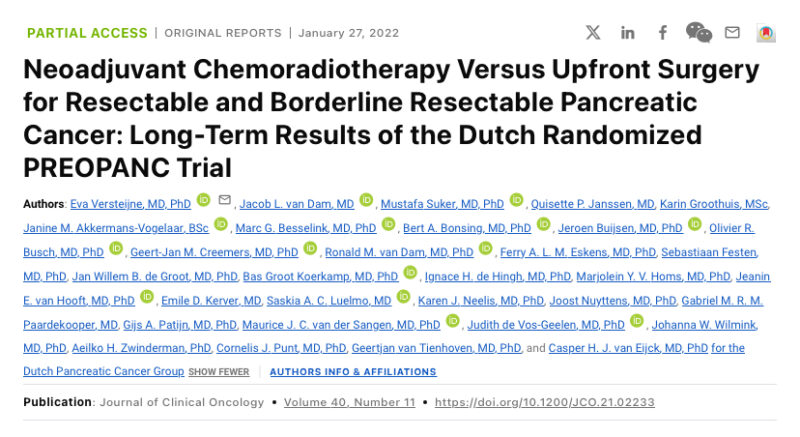
Next up a very important study in Cancer Cell from Yang Chen, Raghu Kalluri, identifying the functional relevance of type 1 collagen in Pancreatic Cancer fibroblasts. Published in 2021, this has been cited >400 times.
Authors: Yang Chen et al.
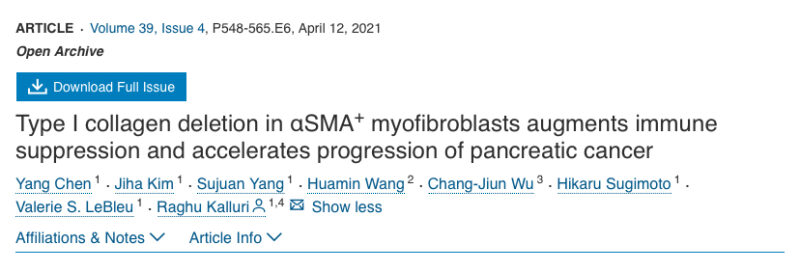
I am including this study because it is a quasi original research paper, although one could argue this might cross over into a review. Nonetheless, this AGA Journal paper on Worldwide Burden of, Risk Factors for, and Trends in Pancreatic Cancer is an important reference. Published in 2021, it has been cited ~400 times.
Worldwide Burden of, Risk Factors for, and Trends in Pancreatic Cancer
Authors: Junjie Huang et al.
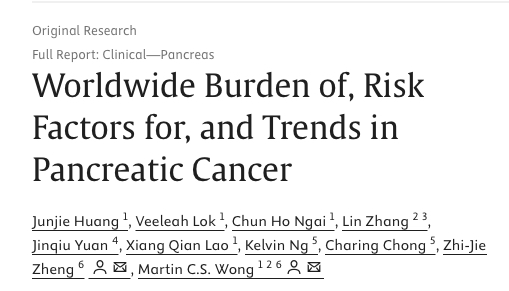
This 2022 NEJM paper on Neoantigen T-Cell Receptor Gene Therapy in Pancreatic Cancer by Eric Tran at Chiles Research made a HUGE splash when it was published. Although an N of 1 case report, it showed that targeting mutant KRASG12D antigens in metastatic disease can lead to profound responses.
Cited >350 times.
Neoantigen T-Cell Receptor Gene Therapy in Pancreatic Cancer
Authors: Rom Leidner et al.
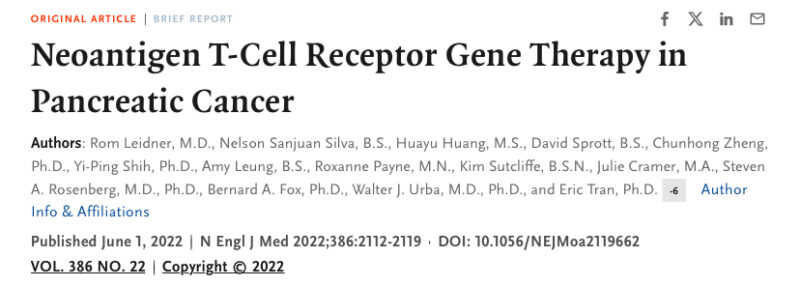
Next up, a 2021 paper in Cell from the DFCI team on the single cell RNA sequencing in metastatic pancreatic cancer and the role of the microenvironment in shaping cell state and therapeutic responses. Cited ~350 times.
Microenvironment drives cell state, plasticity, and drug response in Pancreatic Cancer
Authors: Srivatsan Raghavan et al.
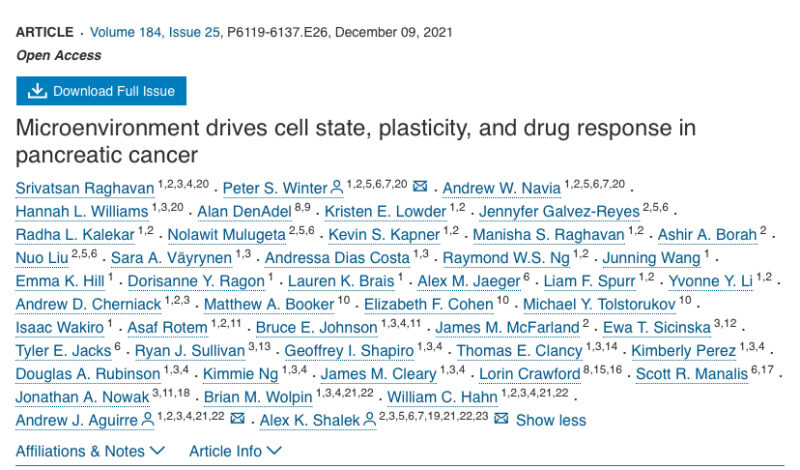
This single cell RNA sequencing paper of primary & metastatic Pancreatic Cancer from Pasca Lab, Nina Steele et al published in Nature Cancer in 2020 remains an important reference in the field. The paper is cited >300 and I have seen secondary analyses of the data in many papers since.
Multimodal mapping of the tumor and peripheral blood immune landscape in human pancreatic cancer
Authors: Nina G. Steele et al.
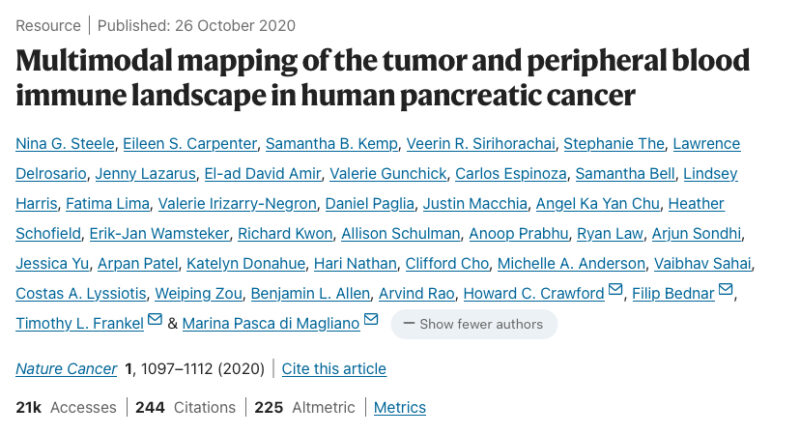
Another seminal paper – this one from Barbara Grünwald, Rama Khokha in Cell on Spatially confined sub-tumor microenvironments in Pancreatic Cancer really helped define the concept of ‘neighborhoods’ in this disease. Published in 2021 and cited close to 300 times.
Spatially confined sub-tumor microenvironments in pancreatic cancer
Authors: Barbara Grünwald et al.
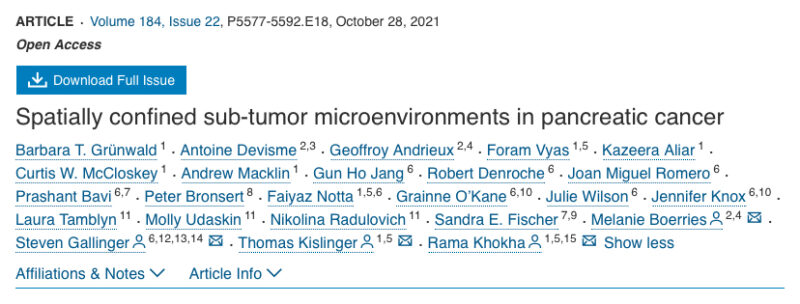
Next, this NEJM paper from our KRAS David Hong on Sotorasib in KRAS p.G12C–Mutated Advanced Pancreatic Cancer.
Published in 2023, this guideline changing paper has been cited >260 times.
Sotorasib in KRAS p.G12C–Mutated Advanced Pancreatic Cancer
Authors: John H. Strickler et al.
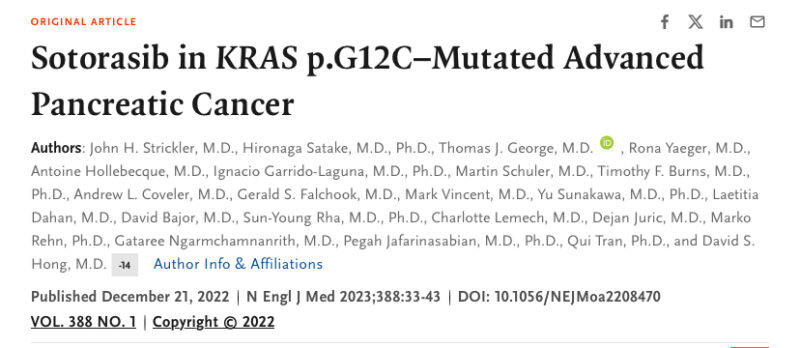
If a paper on KRASG1C pops up, can KRASG12D be far behind? Rounding up the top ten is a preclinical study on MRTX1133 from Ben Stanger and colleagues in Cancer Discovery AACR published in 2023 has been cited >200 times.
Efficacy of a Small-Molecule Inhibitor of KrasG12D in Immunocompetent Models of Pancreatic Cancer
Authors: Samantha B. Kemp et al.
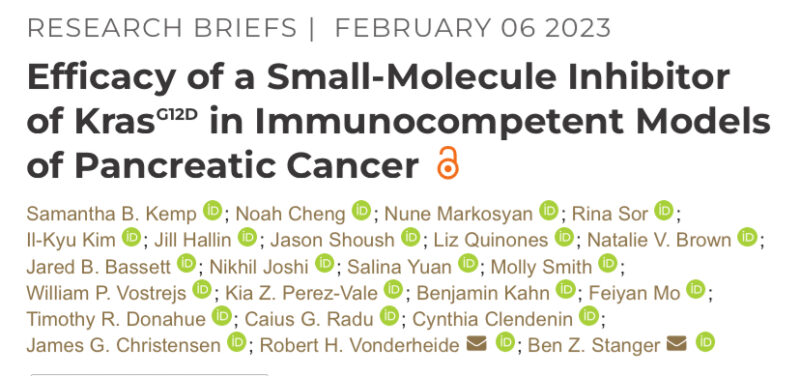
A couple of other highly cited papers that are in the ballpark and should be included.
This CCR AACR paper published in 2021 on determinants of fibroblast identity and composition in pancreatic cancer, from Pasca Lab, Nina Steele, Biffi Giulia et al. Cited >200 times.
Inhibition of Hedgehog Signaling Alters Fibroblast Composition in Pancreatic Cancer
Authors: Nina Steele et al.
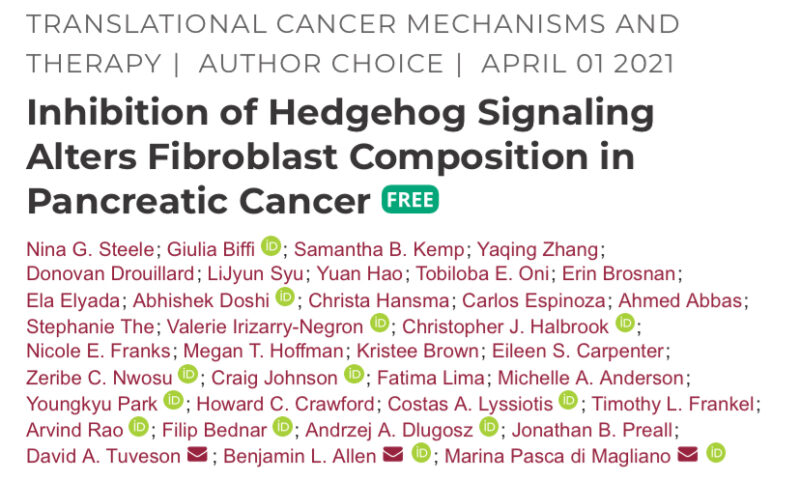
Finally, a 2022 paper in Nature Genetics from William Hwang, Jacks Lab, Koch Institute at MIT, on how neoadjuvant therapy alters the pancreatic cancer ecosystem. One of the first comprehsnive spatial transcriptomics profiling studies in this disease. Cited >200 times.
Authors: William L. Hwang et al.
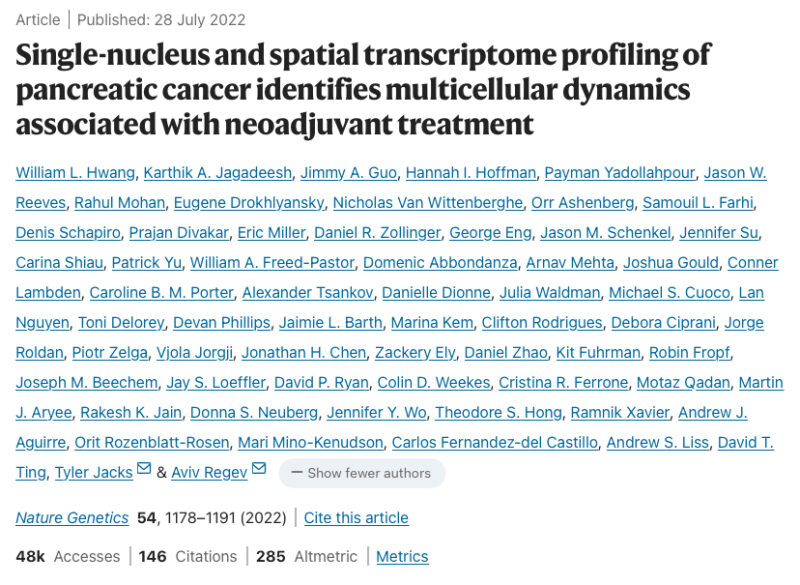
Sorry if I missed any highly cited papers in this list. I think citations by peers are a more objective measure of the impact of a publication than the IF of the journal the paper is published in. Lots of great progress has happened in Pancreatic Cancer over the past five years. Here is to lots more over the next five!
The ultimate goal is to improve long term survival and to get some of the exciting research advances we are seeing into the clinic as fast as possible.”
Dr. Anirban Maitra serves as Professor of Pathology and Translational Molecular Pathology at UT MD Anderson Cancer Center since August 2013, and directs the Sheikh Ahmed Pancreatic Cancer Research Center. He leads an NCI-funded laboratory dedicated to pancreatic cancer research, focusing on genetics and molecular pathology in human and mouse models. His research aims to advance early detection and interception strategies to enhance patient survival rates in pancreatic cancer.


